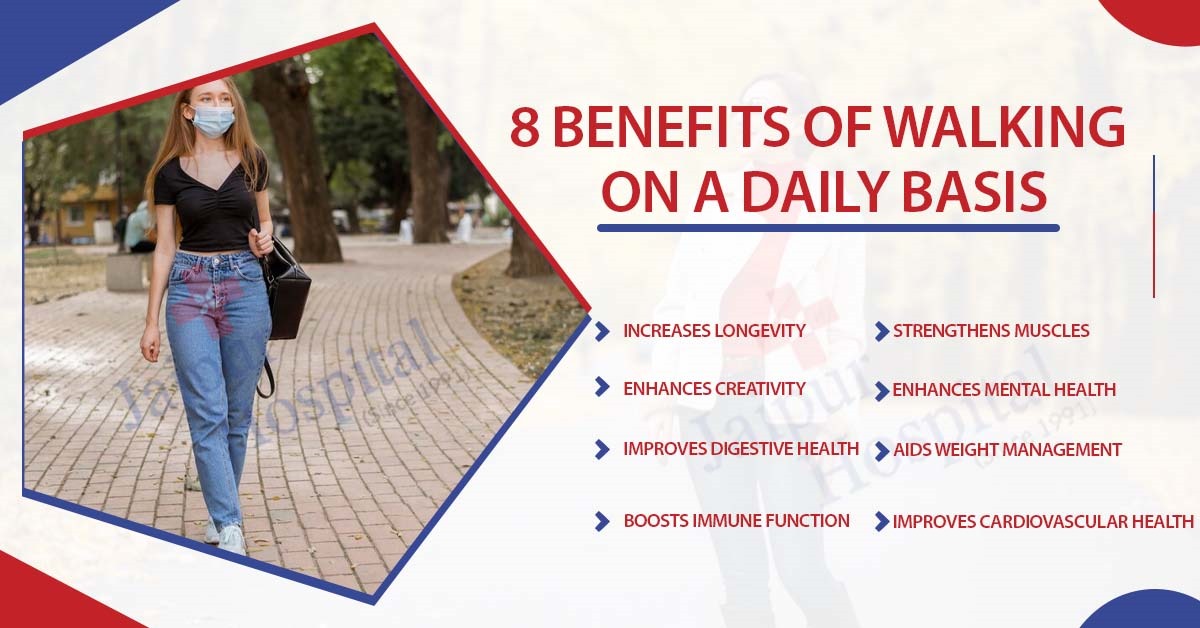Overview
Walking daily offers numerous benefits for both physical and mental health, making it an accessible and effective form of exercise for people of all ages. In this discussion, we will explore how regular walking can improve cardiovascular health, aid in weight management, and enhance muscle and joint function. Additionally, we will delve into the psychological advantages, such as stress reduction, improved mood, and enhanced cognitive function. Lastly, we will provide practical tips for incorporating more walking into your daily routine and discuss ways to stay motivated and track progress.
8 Benefits of Walking
Walking daily provides a myriad of benefits that span physical, mental, and psychological health. Here are eight key benefits:
Improves Cardiovascular Health:Regular walking is a form of aerobic exercise that strengthens the heart muscle. It reduces the risk of heart disease by lowering levels of LDL cholesterol (the “bad” cholesterol) and increasing levels of HDL cholesterol (the “good” cholesterol). Walking also helps lower blood pressure by improving circulation and promoting the dilation of blood vessels.
Aids in Weight Management: Walking helps burn calories, contributing to weight loss or weight maintenance. A study published in the Journal of Physical Activity and Health found that walking at a moderate pace burns about 100 calories per mile. Additionally, regular walking can boost metabolism, helping the body burn more calories even at rest.
Enhances Muscle and Joint Function: Walking is a weight-bearing exercise that strengthens bones and muscles, particularly in the lower body. It improves flexibility and range of motion, which helps maintain healthy joints and reduces the risk of conditions like osteoarthritis.
Boosts Immune Function: Moderate-intensity exercise, such as brisk walking, has been shown to enhance immune function by promoting the circulation of immune cells and antibodies throughout the body. This can help the body defend against infections more effectively.
Reduces Stress: Walking, especially in natural environments such as parks or green spaces, has been found to lower levels of cortisol, the stress hormone. A study published in the Journal of Environmental Psychology showed that participants who walked in a natural environment experienced greater reductions in cortisol levels compared to those who walked in urban environments.
Improves Mood: Exercise, including walking, stimulates the release of endorphins, neurotransmitters in the brain that act as natural mood lifters. Regular physical activity has been linked to reduced symptoms of depression and anxiety. A meta-analysis published in the American Journal of Preventive Medicine found that exercise interventions, including walking, were associated with a significant reduction in depressive symptoms.
Enhances Cognitive Function: Walking promotes better blood flow to the brain, delivering oxygen and nutrients that support cognitive function. Physical activity has been linked to improvements in memory, attention, and executive function. A study published in the Proceedings of the National Academy of Sciences found that regular aerobic exercise, such as walking, led to increases in hippocampal volume, a brain region involved in memory and learning.
Promotes Better Sleep: Regular physical activity, including walking, helps regulate circadian rhythms and promote deeper, more restful sleep. Exercise increases the production of serotonin, a neurotransmitter that helps regulate sleep-wake cycles. A study published in the journal Sleep Medicine found that individuals who engaged in regular physical activity reported better sleep quality and duration compared to those who were sedentary.
Also read :- Kidney Stones: Causes, Symptoms, Diagnosis & Treatment
Walking Benefits Tips
Here are some practical tips to maximize the benefits of walking:
- Start Slowly: If you’re new to walking or exercise in general, start with short, easy walks and gradually increase the duration and intensity over time. Aim for at least 30 minutes of moderate-intensity walking most days of the week.
- Choose the Right Shoes: Invest in a good pair of walking shoes that provide proper support and cushioning for your feet. Ill-fitting or worn-out shoes can lead to discomfort or injury.
- Warm Up and Cool Down: Before starting your walk, perform some light stretching exercises to warm up your muscles and prepare your body for activity. Afterward, cool down with some gentle stretches to help prevent stiffness.
- Maintain Good Posture: Keep your head up, shoulders back, and abdomen engaged while walking to maintain good posture and reduce the risk of strain or injury. Swing your arms naturally at your sides to help propel you forward.
- Stay Hydrated: Drink water before, during, and after your walk to stay hydrated, especially on hot days or during longer walks. Dehydration can impair performance and increase the risk of heat-related illnesses.
- Listen to Your Body: Pay attention to how your body feels during your walks. If you experience pain or discomfort, slow down, take a break, or stop and rest if necessary. Pushing through pain can lead to injury.
- Mix It Up: Keep your walks interesting by varying your route, terrain, and pace. Explore different neighborhoods, parks, or trails to keep things exciting and prevent boredom.
- Set Goals and Track Progress: Set realistic goals for your walking routine, whether it’s increasing your distance, improving your speed, or reaching a certain number of steps per day. Use a fitness tracker or smartphone app to track your progress and stay motivated.
- Walk with Purpose: Incorporate walking into your daily routine by walking to work, to the store, or to run errands whenever possible. This adds purpose to your walks and helps you accumulate more steps throughout the day.
- Stay Consistent: Consistency is key to reaping the benefits of walking. Make walking a regular part of your daily routine, and try to stick to it even on days when you don’t feel like it. Remember, every step counts toward better health!
Also read :- Hepatitis: Symptoms, Causes, Complications, Treatments and Prevention
Tips for Staying Safe while Walking:
Staying safe while walking is essential for enjoying the benefits of this activity without unnecessary risks. Here are some tips to ensure your safety:
- Stay Visible: Wear bright or reflective clothing, especially when walking during low-light conditions or at night. This helps increase your visibility to drivers and other pedestrians.
- Obey Traffic Rules: When walking near roads or intersections, obey traffic signals, use crosswalks, and look both ways before crossing. Be especially cautious at busy intersections.
- Walk Facing Traffic: If sidewalks are unavailable, walk facing oncoming traffic to see vehicles approaching. This allows you to react quickly and move out of the way if necessary.
- Stay Alert: Avoid distractions like texting or listening to loud music while walking, as these can prevent you from noticing potential hazards such as uneven pavement or approaching vehicles.
- Watch Your Step: Be mindful of your surroundings and watch out for obstacles like potholes, debris, or uneven surfaces that could cause trips or falls.
- Walk with a Buddy: Whenever possible, walk with a friend or in groups, especially in unfamiliar or isolated areas. There’s safety in numbers, and companionship can provide reassurance.
- Carry Identification: Always carry some form of identification, such as an ID card or a note with emergency contact information, in case of an accident or medical emergency.
- Stay Hydrated: Bring water with you, especially on longer walks or in hot weather, to stay hydrated and prevent dehydration-related issues.
- Be Prepared for Weather: Dress appropriately for the weather conditions. Wear layers in cold weather and use sunscreen and a hat in sunny conditions. Carry an umbrella or raincoat if rain is expected.
Conclusion
In conclusion, incorporating daily walking into your routine offers a multitude of benefits for both physical and mental well-being. From improving cardiovascular health and aiding in weight management to reducing stress and enhancing cognitive function, the advantages are numerous. By prioritizing safety and staying mindful of your surroundings, you can reap the rewards of this simple yet powerful form of exercise. So, lace up your shoes, step outside, and take advantage of the transformative benefits that daily walking can offer for a healthier and happier life.


